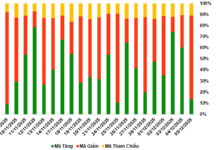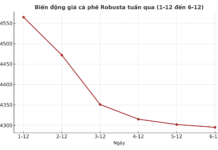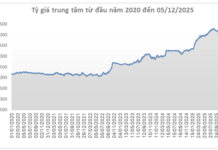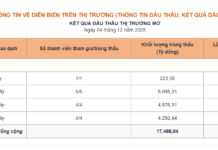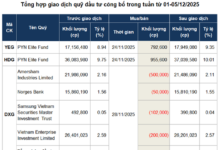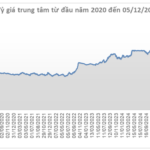The Evolution of Vietnam’s Banking Sector: Embracing Digital Transformation
Over the past decade, Vietnam’s financial and banking sector has undergone a remarkable transformation. The years 2014-2015 marked a turning point for many banks as they began to recover from the 2011-2012 crisis. This period signaled the beginning of new business strategies, revolutionizing the way banks operate and, most importantly, shifting their focus to “customer-centricity.”
Some forward-thinking banks embraced “digital transformation” early on. They started by upgrading their core banking systems, investing in human resources, and adopting modern technologies to offer innovative products and services to their customers. The payments landscape was the first to experience this wave of change.
In 2017-2018, making payments and transfers became significantly more accessible with the widespread adoption of Internet Banking, Mobile Banking, and e-Wallets. Recognizing the importance of customer convenience, many banks also started offering free digital transactions, encouraging customers to embrace these modern platforms.
Concurrently, opening bank accounts and applying for debit/credit cards became faster and more convenient with the introduction of automated banking models, allowing customers to complete these processes 24/7 without visiting a physical branch.
The COVID-19 pandemic, which struck in 2019-2020, significantly impacted the global economy, including Vietnam. However, for the banking sector, it served as a catalyst for accelerating digital transformation.
Instead of operating separate Mobile Banking and Internet Banking platforms, banks began consolidating these services into comprehensive Digital Banks. As a result, customers experienced smoother, faster, and more convenient transactions. The preference for cash payments decreased significantly, while electronic payments continued to grow exponentially.
**The Rise of Online Payments and Impressive Statistics**
Today, online payment methods are ubiquitous across all sectors, from shopping malls and restaurants to traditional markets. Customers can effortlessly swipe their cards, transfer funds, or scan QR codes to make payments without carrying cash.
According to the Vietnam Banks Association (VNBA), in the first half of 2024, non-cash transactions reached 7.83 billion, with a total value of 134.9 million billion VND, representing a remarkable increase of 58.23% in volume and 35.01% in value compared to the same period in 2023.
Specifically, transactions through Internet Banking increased by 49.97% in volume and 32.13% in value, while mobile transactions grew by 59.3% in volume and 38.53% in value. QR Code payments witnessed a staggering growth of 104.2% in volume and 99.5% in value.
Currently, over 87% of adults in Vietnam hold a payment account with a bank, totaling 180 million accounts and 138 million bank cards. The number of merchants accepting card payments has reached 1.8 million, and the network of QR code payment acceptance is rapidly expanding.
A decade ago, transferring funds was a relatively unfamiliar concept to the general public. Even for significant transactions like purchasing real estate or gold, individuals had to withdraw large sums of cash from banks. Fast forward to today, it is rare to see someone carrying a bulky wallet. From modern shopping malls to small retail stores, QR code payments and transfers are widely accepted. Even for small purchases like a cup of tea or a bus ride, people prefer to “scan and pay” instead of using cash.
[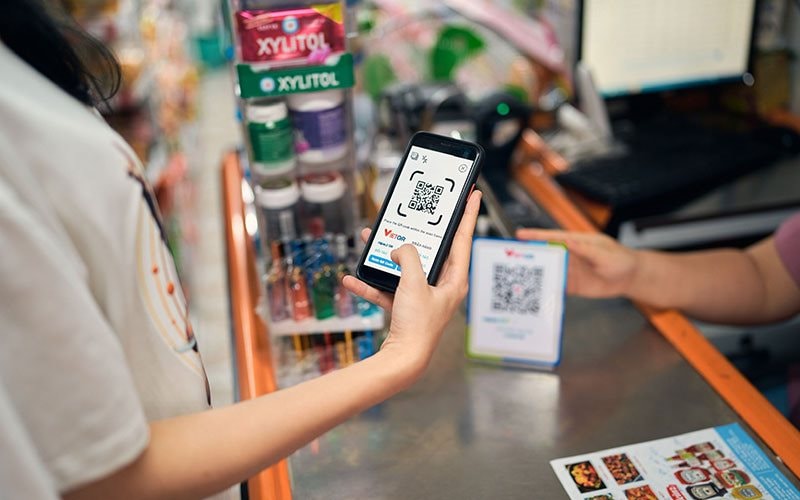 ](https://cafefcdn.com/203337114487263232/2024/9/24/thanh-toan-quet-qr-16853467376861775555427-1727161488264-17271614883901756268533.jpeg)
](https://cafefcdn.com/203337114487263232/2024/9/24/thanh-toan-quet-qr-16853467376861775555427-1727161488264-17271614883901756268533.jpeg)
A telling sign of the banking sector’s evolution is the change in ATM usage during the Tet holiday season. While the number of ATMs has decreased, the long lines and congestion typically seen in previous years have also diminished, indicating a decline in cash withdrawals.
It is undeniable that the COVID-19 pandemic played a pivotal role in driving the adoption of digital banking services. During the social distancing period, online shopping and cashless payment methods gained immense popularity. Even after the pandemic subsided, customers continued to favor cashless transactions over traditional cash payments.
**Building a Comprehensive Digital Ecosystem: The Common Goal of the Banking Industry**
[ ](https://cafefcdn.com/203337114487263232/2024/9/24/fintech-thay-doi-chuoi-gia-tri-dv-nganh-tcnh-1-1727161488714-17271614889121095859378.jpg)
](https://cafefcdn.com/203337114487263232/2024/9/24/fintech-thay-doi-chuoi-gia-tri-dv-nganh-tcnh-1-1727161488714-17271614889121095859378.jpg)
In parallel with the development of electronic payment services, banks have focused on enhancing diverse utilities and interconnecting with other sectors to establish a comprehensive “digital ecosystem” that meets customers’ diverse needs.
Currently, most basic banking services have been digitized (opening payment accounts, issuing bank cards, opening savings accounts, etc.), with 95% of transactions being processed through digital channels.
Opening an account online via Mobile Banking applications has become simpler and faster than ever, thanks to electronic identity verification (eKYC) technology, which utilizes AI and biometrics to authenticate customers’ identities.
Customers can also apply for credit cards, open savings accounts, or apply for unsecured loans online and receive disbursements directly into their personal accounts within minutes, eliminating the need to visit traditional bank branches.
Going beyond basic banking services, many Mobile Banking applications have expanded to include national public services and essential utilities such as electricity, water, telecommunications, healthcare, education, e-commerce purchases, ride-hailing, restaurant reservations, tourism, insurance, and securities trading.
Recently, the four largest banks in Vietnam – Vietcombank, VietinBank, BIDV, and Agribank – started offering gold purchases through their apps, along with cashless payment options, reducing the long queues typically seen at gold transaction points.
Gone are the days when customers had to visit bank counters, queue for hours, and fill out lengthy paperwork. Now, with just an internet-connected device and a banking app, customers can perform most transactions from the comfort of their homes.
Better Choice Awards 2024
Better Choice Awards is an award that honors and promotes the value of Innovation for the practical benefit of consumers, organized by the National Innovation Center in collaboration with VCCorp Joint Stock Company, under the direction of the Ministry of Planning and Investment. Better Choice Awards consists of three main award systems: Smart Choice Awards, Car Choice Awards, and Innovative Choice Awards.
In 2024, Innovative Choice Awards expanded into new fields such as Smart Home, Fashion, Transportation Services, and especially Finance – Banking, with a set of award criteria developed in collaboration with PwC Vietnam.
The award has started accepting nominations through the website: https://betterchoice.vn/ and officially announced information and opened the voting portal on September 9, 2024, after a press conference at the headquarters of the Ministry of Planning and Investment, 6B Hoang Dieu.
26 Commercial Banks Join Vietnam Card Day 2024
The Vietnam Card Day 2024 will feature six key activities, including a thematic workshop and a career orientation seminar for students at the beginning of October. The highlight of the event is the Song Festival, which will take place on October 5-6 at the Bach Khoa Stadium. This festival will be a hub of payment experiences for customers across various devices.
The Future of Finance: Authoring the AI Revolution
Distinguished speakers from a range of fields came together to address the audience at the “Catalysing Innovation with AI” event, hosted by the Association of Chartered Certified Accountants (ACCA) and the British Embassy in Vietnam. This insightful gathering took place on September 18 in the vibrant city of Hanoi.
Viettel Group Constructs 6,000 Billion VND Data Center in Ho Chi Minh City by 2025
The Viettel Group’s leadership announced plans to develop a large data center in Cu Chi at the 5th Ho Chi Minh City Economic Forum. This significant development showcases the group’s commitment to innovation and digital transformation.
The Vice Chairman’s Vision: Ho Chi Minh City’s Path to New Industries
Vice Chairman of the Ho Chi Minh City People’s Committee, Vo Van Hoan, emphasized the need for the city to establish new industries such as new energy, pharmaceutical, cultural, and film industries. He believes that these industries will play a pivotal role in propelling Ho Chi Minh City towards a brighter and more prosperous future. With a keen eye for economic development and a deep understanding of the city’s potential, Mr. Hoan’s vision is to foster innovation and create a thriving environment for these industries to flourish. By doing so, Ho Chi Minh City can position itself at the forefront of these emerging sectors, attracting investments and creating numerous opportunities for its citizens.
“Planning for Prosperity: How Strategic Urban Development Attracts Premier Projects and Investors”
On September 22, Prime Minister Pham Minh Chinh attended the Conference on Announcing the Planning and Investment Promotion of Bac Ninh Province. According to the Prime Minister, planning plays a leading role in guiding sustainable development. Good planning attracts quality projects and investors, ultimately resulting in successful outcomes.


